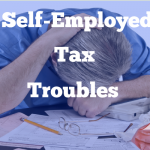Craig Thomas
Latest posts by Craig Thomas (see all)
- Chris Feels Victorious - September 8, 2016
- Are You At Risk of a Levy? - May 26, 2016
- 3 Ways To Survive Your Spouse’s Tax Troubles - February 15, 2016
It’s a safer bet to file your return, whether its required or not.
Tax season’s deadline is upon us, but you say you are not sure whether or not you should report that little bit of income.
Some people are of the mindset that it’s okay not to report all income, as long as it flies under the IRS’ radar. According to a recent IRS poll, 12% of Americans have expressed a tolerance for cheating on their taxes, having the attitude of ‘a little here, a little there, or as much as possible’.
Make no mistake, you need to file a return if your income is above a certain level. That income level varies depending on your current filing status, age, and the type of income you received in 2014. For example, if you and your spouse are both under 65, you are not generally required to file until your joint income reaches $20,300. However, if you’re self-employed, you generally need to file a tax return if your net income for 2014 reaches at least $400 (see chart below).

Regardless of how little you make, and even without any official paper detailing the earnings, the safest thing to do is to file even if you are not required to.
Why File If I Don’t Have Too?
Once you file your return, the IRS has 3 years to audit your return, unless a substantial error is identified. In addition, any liability owed on the return filed expires 10 years from the date filed, or last liability assessment. So, by filing your return, you not only close the loop, but you also start the count down on those 3 year and 10 year clocks.
Another reason to file is that failing to report income may lead to the loss of certain deductions and credits, which rely on taxable income limits (such as childcare and dependent credits).
Yet, another incentive to file is that you may find yourself needing to prove a certain level of income for a mortgage, or credit qualification.
Lastly, you could be cheating yourself out of a tax write off by not filing. Most small businesses have allowable deductions (Home Office, Office Supplies, Mileage, etc), which are offset against income. If your expenses for the year are more than your income, you may have a net operating loss (NOL), which you can apply towards future income. If your business is a Sole Proprietorship, you can directly reduce your individual income with the loss and end up with a nice refund!
For more information on tax resolution services,







